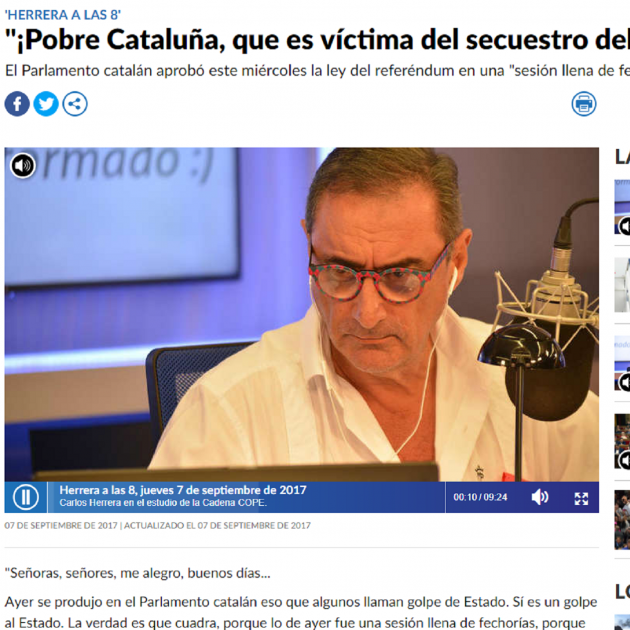The criticisms and rebukes for the passing of the Referendum Law and the signing of the official call for the 1st October vote continue. Spanish radio's editorials started this morning forcefully attacking the Parliament and describing yesterday's events as a "secessionist hold-up".
Carlos Alsina, during Más de Uno on Onda Cero, said "this is not a train crash, it is an assault" and wondered whether Catalan public broadcaster TV3 will continue broadcasting "those ads, sorry, announcements", whilst criticising the Catalan government for having dared to ask private radio station if they could broadcast the "campaign on an illegal act".
Alsina lamented that "all the pro-independence press is trying to put it in the head of the international press that [the Spanish government] are violating their rights, which are our right" and asked "who they believed are the attackers".
His opinion is that "if there's something criminal in this carnival it's that the masquerade was only useful for the masks to fall off, everything yesterday was a simulation of a parliament and a farce" in a "shameful plenary assembly". To summarise his view of events, he took five conclusions from what happened yesterday.
- Voting does not mean voting democratically, but the total absence of respect for democratic procedures.
- That something called a "law" is approved doesn't make it so. It's not a law and the 1st October won't see a referendum. The right to self-determination doesn't exist in any territory of our country.
- Everything about the right to decide was a smokescreen to get non-separatists involved in the break, it's the right to subvert.
- Nor was vice-president Junqueras the sensible man, nor did Convergència (Convergence, former major Catalan party) have a moderate wing, nor would the bourgeoisie end up moving to block the consummation of the break, they've signed up to the silence of the lambs. This was good judgement?
- It's been made evident that the pro-independence spokespeople aren't qualified to speak in the name of Catalonia.
Poor Catalonia...
Carlos Herrera, during Herrera en Cope, wanted to make it clear to his listeners that what took place yesterday was a "coup d'état" because "the truth is that it fits" taking into account that "what happened yesterday was a session full of misdemeanours, because they passed laws in an unjust way ignoring the rules".
Both Herrera and Alsina asked where the leader of Podemos (We Can), Pablo Iglesias, is when "every day they insist on sinking even more his poor image because they associate themselves with dictatorial regimes", justifying this statement under the idea that yesterday the party "placed itself next to the coup".
Because of this, he urged for the Spanish government to "be supported by all decent political parties", whilst he proposed that the Public Prosecutors' Office "start to stock up the lawsuits that those that have allowed this absolute outrage to go ahead merit, because yesterday the Catalan Parliament looked like a circus." All the time referring to the president of the Parliament, Carme Forcadell, as "Carmen" or "my Maricarmen".
"The sketch", according to Herrera, "full of coarse traps has managed to split Catalonia in two" and, because of that, says that that we "will wait to see how the street is managed, how the embarrassment is managed".
Translation: Herrera at 8: "Poor Catalonia, which is the victim of a seizure of the Parliament!"
Grinding up Spain
"Last night the first part of the tearing apart of Spain was consummated in that grinder that separatism and communism set to work some time ago." This was how Federico Jiménez Losantos started his editorial at 6 this morning. But he went a step further on La Mañana de Es Radio and, instead of attacking JxSí (Together for Yes) and CUP (Popular Unity Candidacy), the Catalan government and/or the Parliament and its president, who he said "is a nobody", he criticised the Spanish deputy prime minister, Soraya Sáenz de Santamaría, for "not doing anything" and warned her that if "if you don't want to go to war, give yourself up for lost".
Losantos didn't hold back, describing Santamaría as a "functional semi-illiterate, like her boss, who passed the exam to become a lawyer and from then on has been enjoying life" criticising that "she has a great idea of her herself" even though, in his opinion "she's from Valladolid and can't speak Spanish, which is a serious crime and although she shows the cowardice of her boss, she doesn't spurn trampling over the language like the law".
Asking "what have they done to prevent it?" Losantos also attacked Podemos (We Can), who he branded "communists" for although the signing of the decreeing officially calling the referendum and lamented that "the third political party in the Spanish Parliament gave support by its abstention to the destruction of the law".
In his opinion, Pablo Iglesias' party is "orchestrated and financed by the deputy prime minister of the Spanish government, a grotesque apparition of the deputy prime minister, it directs a media conglomerate and an espionage conglomerate" and, specifically because of that, believes that "the first things that needs pointing out isn't that the separatists are separatists, rather that there's a Spanish party in Spain, profoundly anti-Spanish, anti-liberal and anti-democratic, a party paid for by the narco-dictatorship of Venezuela, by Iran with a ringleader that isn't anything more than the rotten fruit of the cowardly incompetence of this infested government".
Losantos not only praised the reaction of Cs (Citizens) and of PP (Popular Party), but also that of PSC (Socialists' Party of Catalonia), of whom he said "it was very well within the bounds of what the PSC is" because "they refused to be in the chamber whilst the coup d'état took place".
